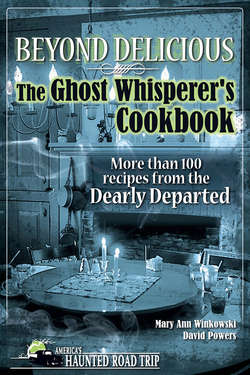Читать книгу Beyond Delicious: The Ghost Whisperer's Cookbook - Mary Ann Winkowski - Страница 14
На сайте Литреса книга снята с продажи.
NEW ENGLAND CLAM CHOWDER
ОглавлениеMOTHERS LIKE TO BELIEVE THEIR CHILDREN WILL mature as they get older. In many ways they do, but in other ways they stay the same bickering siblings they’d been since they were little children. I don’t know if that’s any more true for twins, but Tammy and Terry from Rhode Island were still petty and argumentative when I met them when they were in their 40s.
Don’t get me wrong; they were still close. They lived in the same development, and their families often got together for dinners and cookouts. Tammy was a nurse and Terry was a teacher, so neither of them had a career to lord over the other, but one thing seemed to bring out the inner bickering girls: Mom’s cooking. Or, more specifically, Mom’s recipes.
Their mother, Martha, had been a private caterer, what Terry called her “cottage industry.” She hadn’t been rich, but she’d been a great cook and she’d turned it into a business to put her girls through college. That’s what Mom had wanted more than anything, and she had apparently gone out of her way to not share her recipes when she’d been alive, because she didn’t want the girls to follow her into her business. She wanted them to get good jobs with good pay, which they’d done.
Now Martha had known when she was dying, so they’d had time to plan for their last goodbyes. Often they would sit with her and talk about growing up and the antics they’d all got up to. One day, Martha asked what they wanted of her. She wanted to make sure that each one got something of hers they really wanted, and she wanted them to have it before she died.
But they both wanted her recipes.
Finally, Martha decided they would divide them, and that they would have to share them if one ever wanted a recipe the other one had. They agreed, and the recipes found new homes. One of the ones that Tammy got was a recipe for New England clam chowder, which Terry had always loved, so she asked for a copy of it. Tammy was only too happy to give it to her, but when Terry made it, it just didn’t taste the way she’d remembered—and Terry had an idea of why, because she had not faithfully copied a recipe from her stack that her sister had wanted. She left out an important ingredient to keep the recipe special—something of Mom’s that was hers and hers alone. She had the feeling Tammy had done the same thing with the clam chowder.
This was something they found to argue about, each accusing the other of transcribing recipes wrong on purpose. As it turned out, neither of them was wrong about the other.
“I had a feeling something like this would happen,” Martha told me when I arrived. Terry had called me out because of odd things that had been going on around the house, but Martha was upset with both of them. “Tell them I’m very disappointed they couldn’t share. And tell them I’m not leaving until they do share.”
Fortunately, maturity did finally kick in, and they agreed again to share.
“Prove it,” Martha demanded. “Tell Tammy to tell her what she did with that clam chowder recipe.”
Tammy ’fessed up immediately and told her sister about the missing ingredient, then Terry admitted her own guilt in copying down recipes incorrectly.
“Well now, just to be sure,” I said. “Why doesn’t Mom give me the recipe so we can check it?”
Martha thought that was a great idea, so she did and the recipe was a match for the corrected recipe Tammy had just given Terry.
New England Clam Chowder
2 slices salt pork, diced
1 large onion, minced
2½ cups water
3 large potatoes, diced
1 quart milk
1 quart clams, picked over and chopped fine, with their juice
3 tablespoons butter
Ground black pepper to taste
Crackers
Fry salt pork in large saucepan; add onions and sauté until they begin to brown. Add water and potatoes; bring to a boil, reduce heat, and cook until potatoes are tender, about 15 minutes. Add milk and again bring to a boil. Scald clams with their juice, combine with potato mixture, add butter and pepper, and serve immediately, pouring over the crackers or serving them separately.
